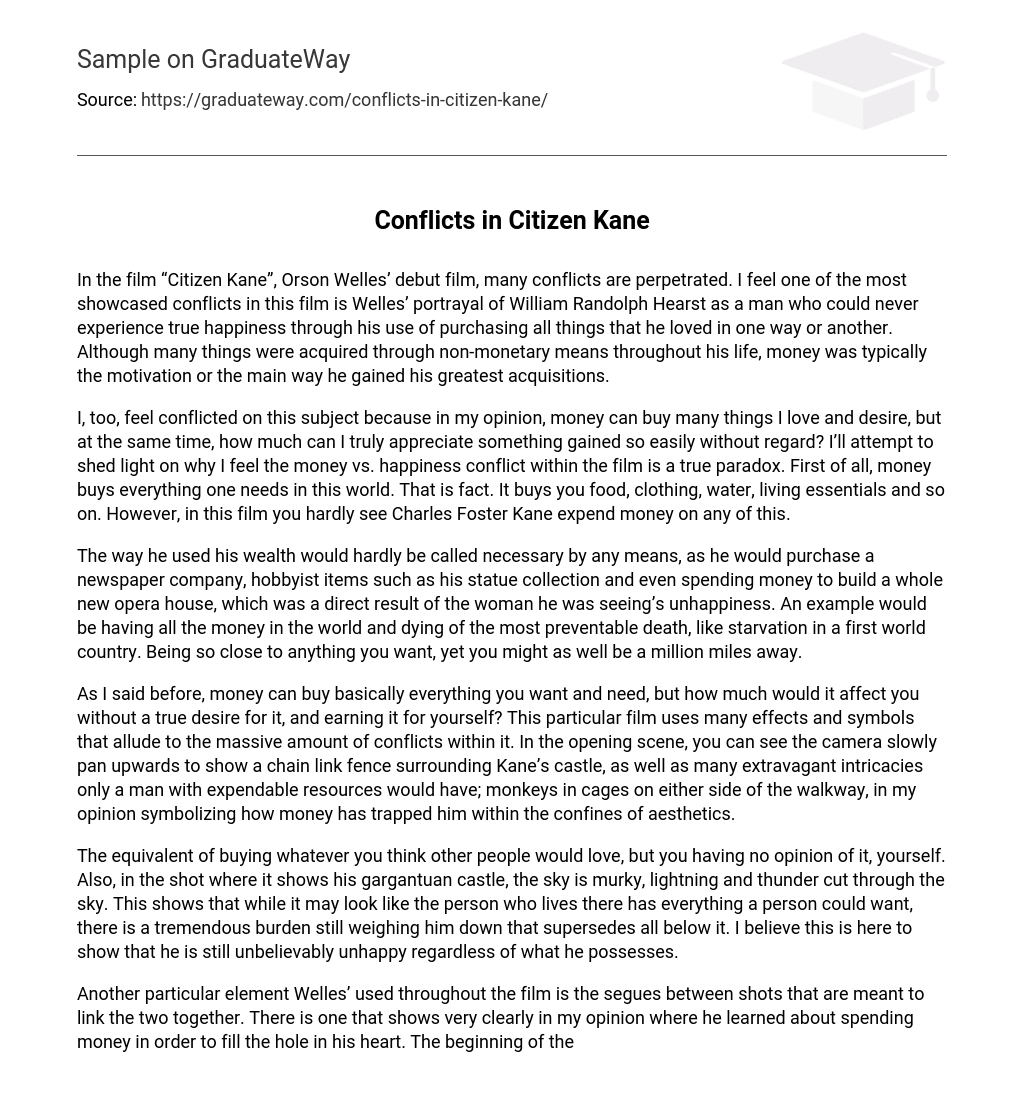In the film “Citizen Kane”, Orson Welles’ debut film, many conflicts are perpetrated. I feel one of the most showcased conflicts in this film is Welles’ portrayal of William Randolph Hearst as a man who could never experience true happiness through his use of purchasing all things that he loved in one way or another. Although many things were acquired through non-monetary means throughout his life, money was typically the motivation or the main way he gained his greatest acquisitions.
I, too, feel conflicted on this subject because in my opinion, money can buy many things I love and desire, but at the same time, how much can I truly appreciate something gained so easily without regard? I’ll attempt to shed light on why I feel the money vs. happiness conflict within the film is a true paradox. First of all, money buys everything one needs in this world. That is fact. It buys you food, clothing, water, living essentials and so on. However, in this film you hardly see Charles Foster Kane expend money on any of this.
The way he used his wealth would hardly be called necessary by any means, as he would purchase a newspaper company, hobbyist items such as his statue collection and even spending money to build a whole new opera house, which was a direct result of the woman he was seeing’s unhappiness. An example would be having all the money in the world and dying of the most preventable death, like starvation in a first world country. Being so close to anything you want, yet you might as well be a million miles away.
As I said before, money can buy basically everything you want and need, but how much would it affect you without a true desire for it, and earning it for yourself? This particular film uses many effects and symbols that allude to the massive amount of conflicts within it. In the opening scene, you can see the camera slowly pan upwards to show a chain link fence surrounding Kane’s castle, as well as many extravagant intricacies only a man with expendable resources would have; monkeys in cages on either side of the walkway, in my opinion symbolizing how money has trapped him within the confines of aesthetics.
The equivalent of buying whatever you think other people would love, but you having no opinion of it, yourself. Also, in the shot where it shows his gargantuan castle, the sky is murky, lightning and thunder cut through the sky. This shows that while it may look like the person who lives there has everything a person could want, there is a tremendous burden still weighing him down that supersedes all below it. I believe this is here to show that he is still unbelievably unhappy regardless of what he possesses.
Another particular element Welles’ used throughout the film is the segues between shots that are meant to link the two together. There is one that shows very clearly in my opinion where he learned about spending money in order to fill the hole in his heart. The beginning of the film shows Kane dying, then segues to a scene where Kane as a child is playing in the snow with what I feel is his prized possession; a snow sled. Throughout the scene, it never leaves his side while his parents are talking with Mr. Thatcher, until the boy is seemingly ripped away from all he knows and attempts to hit Mr.
Thatcher with the sled. Afterwards, a long shot of the sled by itself occurs, in which you see it slowly become covered in snow. The important segue happens here, where it slowly links to another shot of Kane as a boy near a Christmas tree opening a brand new sled. The importance here is that even though it was not the same sled he loved, it was, to him, a sufficient replacement for temporary happiness. In my opinion, this is what started his mission to acquire all that he deemed “necessary” for happiness.
It showed him that his fortune could most certainly acquire anything he wanted; something he would find debunked late into his life before he could do anything to help himself, had he even wanted to or if he even could. In conclusion, I feel that while there could’ve been steps taken early on to present this complex conflict, it almost certainly would’ve transpired anyway. The film itself, to me, presents itself as if Kane was allowed his one possession that made him happy, be it his sled or even his own Mother, that he would’ve turned out okay.
The cruel truth is that given that much money at such a young age, while learning nothing but how to utilize money and the ins and outs of business instead of humility, understanding of people and other moralities, he was doomed. Money was all he knew, and combine that with him having the only people he cared about taken from him, he has no useful social skills in his later life. Money was his key to unlock all of these necessities for living in the real world, though he was never “in” the real world, he was in Kane’s world, and even there he failed.





